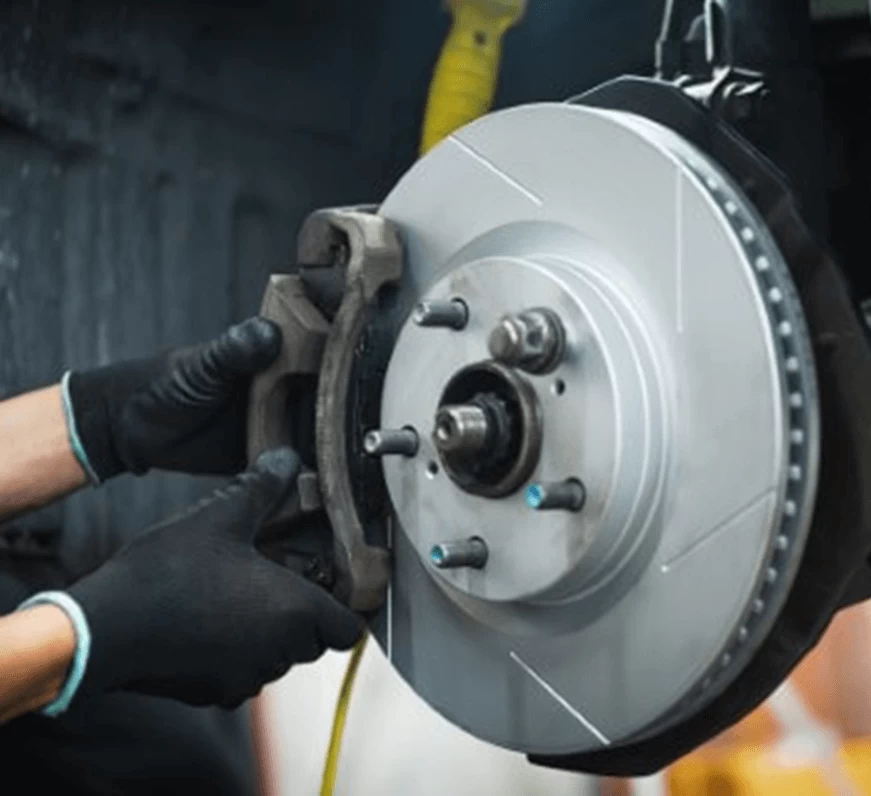At Harbor Brakes, we recommend having your brakes inspected at least once a year or every 12,000 miles, whichever comes first. Regular inspections are essential for ensuring your vehicle's safety and optimal performance.
If you notice any of the following signs, it's essential to schedule a brake inspection promptly:
- Squealing or grinding noises when braking
- Vibrations or pulsations in the brake pedal
- Increased stopping distances
- Brake warning lights illuminated on your dashboard
These symptoms may indicate worn brake pads, damaged rotors, or other issues that require immediate attention.
For more detailed information on brake maintenance and services, explore the following resources:
- Brake Repair Services: Learn about our comprehensive brake repair offerings.
- Knowing When to Replace Your Brakes: A Comprehensive Guide: Understand the signs that indicate it's time for a brake replacement.
- Common Myths About Brakes Debunked: Discover the truth behind common brake misconceptions.
Regular brake inspections not only ensure your safety but also help in maintaining your vehicle's longevity. Our experienced technicians at Harbor Brakes are here to provide top-notch service and keep your vehicle running smoothly.
The lifespan of brake pads can vary depending on driving habits, road conditions, and the quality of the brake pads. Typically, brake pads last between 30,000 to 70,000 miles, but it is important to have them inspected regularly to ensure they are functioning properly.
How Long Do Brake Pads Last?
The lifespan of brake pads varies depending on several factors, including your driving habits, road conditions, and the quality of the brake pads you choose. On average, brake pads typically last between 30,000 and 70,000 miles.
However, more aggressive driving, frequent stop-and-go traffic, or poor road surfaces can cause your brake pads to wear out much sooner. To maintain optimal braking performance and ensure your safety, it’s crucial to have your brake system inspected regularly.
Neglecting worn brake pads can lead to more expensive repairs, such as damaged rotors or calipers. If you hear squealing, grinding, or experience reduced braking performance, contact Harbor Brakes immediately for a professional evaluation.
There are several signs that indicate your brakes may need to be repaired, including squeaking or grinding noises when applying the brakes, a pulsating or vibrating brake pedal, or a longer stopping distance. If you experience any of these symptoms, it is best to have your brakes inspected by a professional as soon as possible.
How Do I Know If My Brakes Need to Be Repaired?
Your vehicle’s braking system often gives clear warning signs when something isn’t right. Common indicators that your brakes may need repair include:
- Squeaking or grinding noises when you apply the brakes
- A pulsating or vibrating brake pedal, especially during stopping
- Longer stopping distances or a “soft” brake pedal feel
- Brake warning lights appearing on your dashboard
These symptoms could point to worn brake pads, warped rotors, or issues with your hydraulic system. Ignoring them can compromise your safety and lead to more expensive repairs down the line.
If you're experiencing any of these symptoms, don’t delay, have your brakes inspected by a professional technician as soon as possible to stay safe on the road.
A brake service typically includes a thorough inspection of the brake system, brake pad replacement if necessary, brake fluid replacement, and rotor resurfacing or replacement if needed. A professional brake service can help ensure that your vehicle's brakes are functioning properly and help prevent costly repairs down the road.
What Is Included in a Brake Service?
A professional brake service is a comprehensive process designed to keep your vehicle’s braking system safe, responsive, and reliable. A standard brake service typically includes:
- A detailed inspection of the entire brake system, including pads, rotors, calipers, and brake lines
- Brake pad replacement if the pads are worn or below the safe thickness
- Brake fluid exchange to remove moisture and maintain braking performance
- Rotor resurfacing or replacement, depending on their condition and thickness
- Cleaning and lubrication of brake components to ensure smooth operation and prevent corrosion
By addressing these critical components, brake service helps extend the life of your braking system and prevent more expensive repairs in the future.
Yes, in addition to brake repair and maintenance, our shop offers a range of other car maintenance and repair services, including alignments, suspension repair, and diagnostic services. Our experienced technicians can help keep your vehicle running smoothly and efficiently.
Can You Perform Other Car Maintenance and Repair Services?
Yes! At Harbor Brakes, we offer much more than just brake repair and maintenance. Our experienced technicians provide a full range of car maintenance and auto repair services to keep your vehicle running smoothly and safely. Our services include:
- Suspension repair to restore a smooth, controlled ride
- Diagnostic services to quickly identify and fix performance issues
- General automotive maintenance, including fluid checks, inspections, and more
Whether you need routine maintenance or complex repairs, we are committed to delivering reliable service and expert care for your vehicle.
The time it takes to perform a car maintenance or repair service can vary depending on the type of service needed and the condition of your vehicle. Our team strives to complete services in a timely and efficient manner while ensuring quality workmanship.
How Long Does a Car Maintenance or Repair Service Take?
The duration of a car maintenance or repair service can vary depending on the specific service required and the overall condition of your vehicle. For example:
- Routine maintenance (like oil changes or fluid checks) typically takes 30 to 60 minutes
- Brake repair or pad replacement may take 1 to 2 hours, depending on the extent of wear
- Suspension or diagnostic services may take longer, depending on complexity and part availability
At Harbor Brakes, we prioritize timely service without compromising on quality workmanship. We’ll provide an accurate estimate and keep you updated throughout the process.




